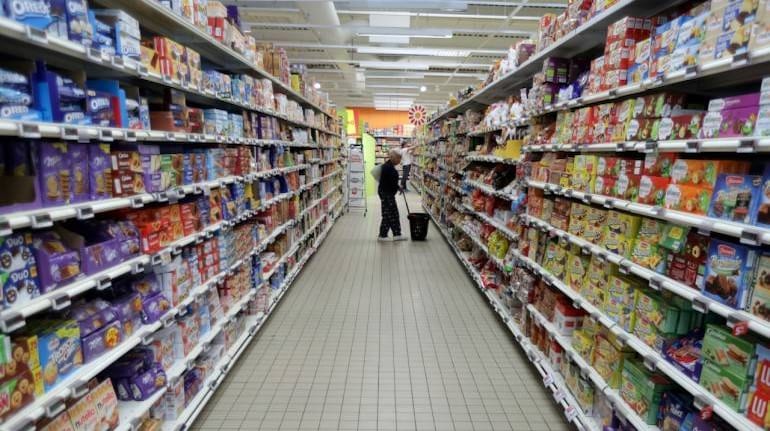



The fast-moving consumer goods (FMCG) sector managed to display resilience in the face of soaring raw material costs and a slowing domestic demand environment in the quarter ended March but that resilience masked growing concerns over its performance in 2022-23.
Heading into the earnings season, investors were most concerned about the earnings performance of FMCG companies, given the signs of rural distress, rising costs and a lack of ability to fully pass on higher costs to consumers.
In the March quarter, net sales of listed FMCG companies rose at a moderate 7.7 percent on-year to Rs 82,576 crore, according to data available on AceEquity. The sector’s bottomline grew 8.3 percent on-year to Rs 11,540 crore.
Despite the sharp rise in costs, FMCG companies reported only a five basis points year-on-year decline in operating margins to 19.98 percent at an aggregate level, as price hikes helped mitigate some pain.
Investors have rewarded the better-than-expected showing, as the Nifty FMCG index has risen 2.7 percent, so far, in 2022 as compared to Nifty 50’s 4.5 percent decline.
Analysts believe that resilience in the margin performance of the sector was also down to larger firms squeezing channel partners to absorb higher costs in the hope that the situation may turn around in the coming quarters.
Also read: FMCG demand slows in rural markets for third successive quarter in Q1 2022: NielsenIQ
HopeSome of the sector’s biggest companies sounded hopeful in their interaction with analysts following their earnings announcements on revival in the second half of 2022-23.
Hindustan Unilever’s Chief Executive Officer (CEO) and Managing Director (MD) Sanjiv Mehta told analysts that easing of the geopolitical crisis in Eastern Europe would result in cooling off of global commodity prices, which could result in revival of demand and growth. “So, I am hopeful but very difficult to put our finger on when this will happen,” Mehta said in April.
Similarly, Dabur India’s CEO Mohit Malhotra is counting on the second half of 2022-23 to see easing of inflation pressures that will allow margins to improve to their normal levels.
“It’s a wait and watch but (in) the second half of the year we expect inflation to kind of abate a bit,” Malhotra told analysts in a post-earnings call.
Recent government measures on easing cost of edible oils, a key ingredient for FMCG companies, onset of a normal monsoon and decent increase in kharif season crop sowing have improved outlook for input costs for companies.
On the demand side, emerging signs are pointing towards some revival in rural demand. HUL’s MD Mehta believes there is an argument for a rural sector recovery due to good harvest, a normal monsoon season and higher agricultural prices.
“The government is spending Rs 7.5 lakh crore on capex and if that is front ended, which I believe it should be, then we should start seeing a recovery happening,” Mehta said.
Also read: FMCG industry reports volume decline in January-March as consumption slows: Report
RealityWhile hope floats, the reality is starker given that rising product prices have started to weigh on demand in both rural and urban markets.
Rural markets have been the hardest hit as stagnating farm incomes amid rising prices have forced consumers to downtrade or cut down on spending.
“Due to unprecedented inflation, consumers are tightening volumes and essentials are being prioritised over discretionary categories,” HUL’s Mehta said.
On the margin side, analysts believe that crude oil and derivatives will hold the key as oil prices have shown no signs of easing in recent weeks.
The benchmark Brent crude oil futures touched $123 a barrel on May 31 after hitting an eight-year high of $137 in March as growing supply disruptions weigh on the market.
“We are not hopeful of that revival in margins and volumes will happen this quarter or in many quarters going ahead,” said Abhay Agarwal, founder and fund manager at Piper Serica, who has retained his negative view on the space.
Agarwal expects FMCG companies to fight very hard to sustain current levels of margins and volumes in 2022-23 in the face of rising challenges.
Kotak Institutional Equities said the underperformance of FMCG stocks in the past 18 months had done little to revert their trailing valuations towards long-term average. “Valuations of ‘growth’ stocks in the consumption sectors are still quite expensive,” Kotak Equities said.
Despite the correction, HDFC Securities, too, does not see room for any valuation upsides, it rather expects “more valuation risks in the next few years”.
Disclaimer: The views and investment tips expressed by experts on Moneycontrol.com are their own and not those of the website or its management. Moneycontrol.com advises users to check with certified experts before taking any investment decisions.
Discover the latest Business News, Sensex, and Nifty updates. Obtain Personal Finance insights, tax queries, and expert opinions on Moneycontrol or download the Moneycontrol App to stay updated!
Find the best of Al News in one place, specially curated for you every weekend.
Stay on top of the latest tech trends and biggest startup news.